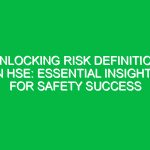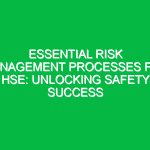Hello team,
Today, we are going to discuss an important topic that directly impacts our health, safety, and work environment: Food Allergies. It is crucial to understand how food allergies can affect individuals in our workplace and the necessary precautions we need to take to ensure a safe and healthy environment for everyone.
What Are Food Allergies?
Food allergies are a result of the body’s immune system overreacting to specific proteins found in certain foods. When someone with a food allergy consumes the allergen, their immune system identifies it as a threat and releases chemicals like histamine, leading to a range of symptoms that can vary from mild to severe.
Common Food Allergens
- Peanuts
- Tree nuts
- Milk
- Eggs
- Wheat
- Soy
- Fish
- Shellfish
It’s essential to be aware of these common food allergens and the potential risks they pose to individuals with allergies.
Importance of Food Allergy Awareness
Understanding food allergies is crucial in maintaining a safe workplace. Accidental exposure to allergens can lead to severe reactions, including anaphylaxis, which is a life-threatening allergic reaction. By being knowledgeable about food allergies, we can prevent accidents and create a supportive environment for all employees.
Identifying Food Allergies in the Workplace
It’s important to be aware of any colleagues who have food allergies and understand the specific allergens that can trigger a reaction. Clear communication and cooperation are key in ensuring that everyone is informed and taking the necessary precautions to prevent exposure to allergens.
Preventing Cross-Contamination
Cross-contamination can occur when allergens come into contact with surfaces, utensils, or other foods, potentially leading to allergic reactions in sensitive individuals. To prevent cross-contamination:
- Use separate utensils and cooking equipment for allergen-free foods.
- Thoroughly clean and sanitize work surfaces to remove any traces of allergens.
- Label allergen-containing foods clearly and store them separately from other items.
By following these practices, we can minimize the risk of accidental exposure to allergens in our workplace.
Creating an Allergy-Aware Environment
Building an allergy-aware environment involves the collective effort of all team members. By being mindful of food allergies, practicing good hygiene, and supporting colleagues with allergies, we can create a safe and inclusive workplace for everyone.
Training and Education
Providing training on food allergies and proper handling of allergens is essential for all employees. By educating ourselves and raising awareness, we can better understand the importance of preventing cross-contamination and supporting colleagues with allergies.
Regulations and Compliance
It’s important to be aware of any regulations or company policies related to food allergies in the workplace. Compliance with these standards not only ensures the safety of all employees but also fulfills our legal obligations to provide a hazard-free environment.
Conclusion
Today’s Toolbox Talk has shed light on the importance of understanding food allergies and the impact they can have on our workplace. By being proactive, knowledgeable, and supportive of colleagues with allergies, we can promote a safe and healthy environment for all employees.
Thank you for your attention and commitment to safety. Let’s work together to keep our workplace free from food allergen hazards.


